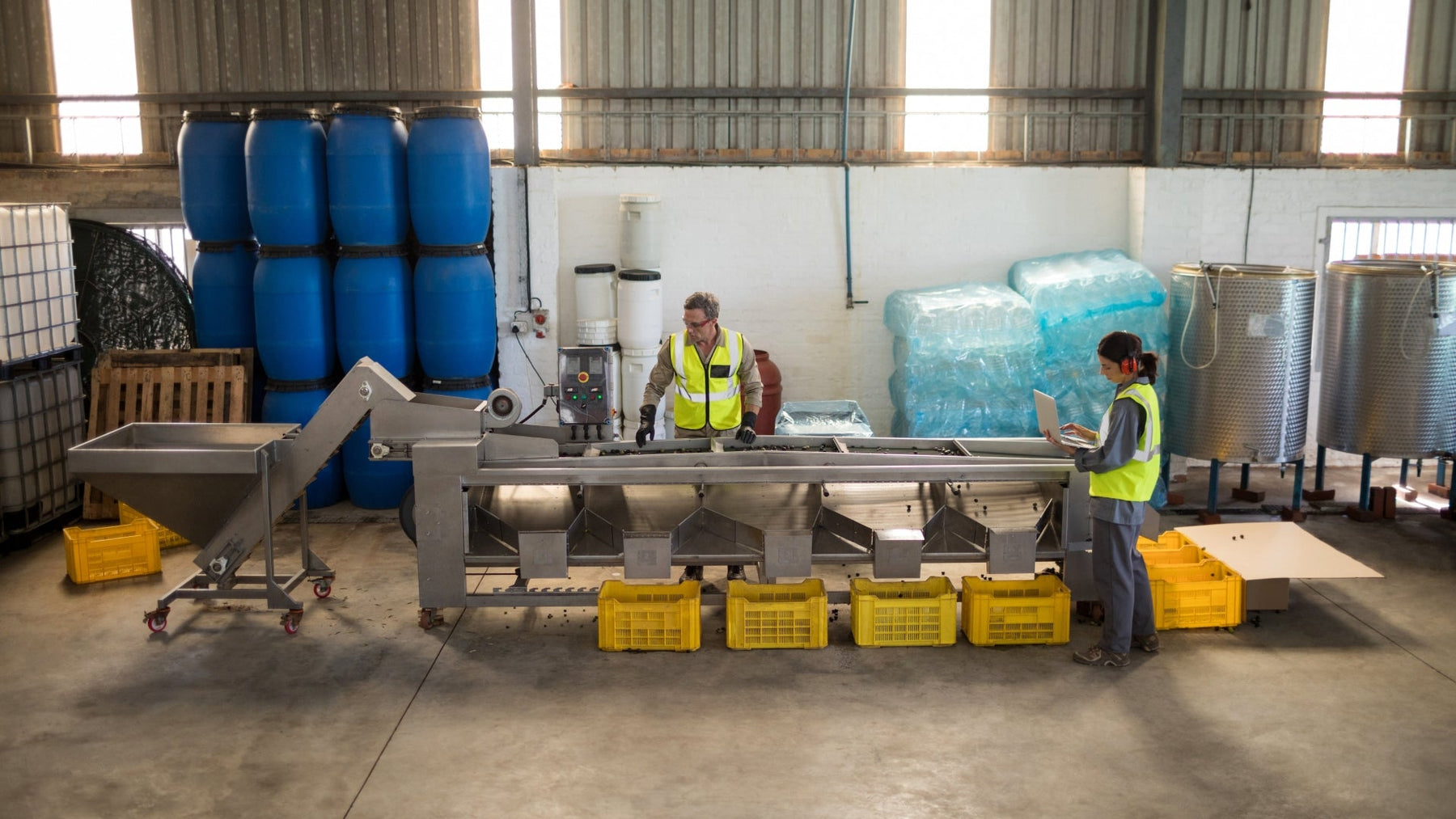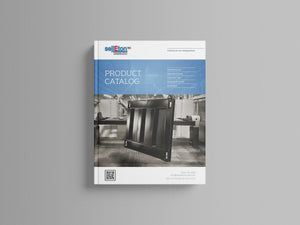
Optimizing Production with Automated Weighing Systems: Industry 4.0 Solutions
Automated weighing systems are revolutionizing industries by providing accurate and efficient weight measurements. These systems are essential for industries like pharmaceuticals, food processing, and manufacturing, where precision and efficiency are paramount. In this article, we’ll explore how automated weighing systems work, their main components, and the benefits they bring to modern production processes.
Key Takeaways
-
Automated weighing systems enhance accuracy and efficiency across various industries by providing precise measurements and streamlining production processes.
-
Key benefits of implementing these systems include reduced human error, improved productivity, and enhanced quality control, thus ensuring compliance with industry standards.
-
Future trends in automated weighing systems emphasize integration with Industry 4.0, advances in machine learning, and a focus on sustainability to bolster operational efficiency.
Understanding Automated Weighing Systems
Automated weighing systems provide innovative solutions tailored to meet a wide range of industrial needs, from pharmaceuticals to food processing. These systems are essential for achieving scalable automation in weighing processes, ensuring both accuracy and efficiency. They come in various forms, including:
-
Dispensers
-
Check-weighing systems
-
Conveyor scales
-
Unattended truck kiosks
Each is designed to cater to specific industrial applications.
The importance of automated weighing systems lies in their ability to provide accurate and reliable measurements, which are crucial for maintaining product quality and compliance with industry standards. These systems can be categorized based on their application and operational principles, ensuring efficiency across different tasks. For instance, some systems are designed for continuous measurement, while others are tailored for batch processing or quality control.
Automated weighing equipment systems offer intricate solutions that can be adapted to specific operational needs, providing various configurations to cater to different industrial activities. Whether it’s conveyor belt scales for continuous measurement or batch weighing systems for precise ingredient mixing, these systems enhance overall production efficiency and competitiveness. The incorporation of a weighing system can further streamline these processes.
Key Components of Automated Weighing Systems
The backbone of automated weighing systems lies in their key components, which include:
-
Load cells, often made from stainless steel, critical for providing high durability and precision in weight measurement.
-
Batch weighing systems.
-
Data processing units.
These components ensure that the system systems can withstand harsh industrial environments while delivering accurate and reliable measurements.
Batch weighing systems play a crucial role in industries like pharmaceuticals and food processing, where precise measurement and combination of ingredients are essential. These systems automate the dispensing and mixing processes, ensuring that each batch meets the required specifications. These systems ensure compliance with industry standards and maintain consistent product quality.
How Automated Weighing Systems Work
At the heart of automated weighing systems is the integration of weighing machines, product handling devices, and data processing systems. This seamless integration streamlines the weighing process, ensuring that products are accurately weighed as they move through the production line. For instance, products can be transported to the scale by a conveyor or similar device, allowing for continuous and automated weight measurement.
The data collected during the weighing process can be used immediately for quality control or stored for later analysis. Integrating weighing systems with management software enhances product tracking and overall production efficiency. Automatic weighing systems ensure high accuracy, which is essential for maintaining quality in production and meeting industry standards.
Benefits of Implementing Automated Weighing Systems
Implementing automated weighing systems in production processes brings about numerous benefits that can transform the efficiency and accuracy of operations:
-
Optimize efficiency, ensuring that tasks are completed quickly and accurately
-
Enhance overall productivity
-
Streamline the weighing process
-
Significantly improve operational efficiency
-
Reduce the likelihood of human error
The integration of advanced technologies in automated weighing systems not only enhances production efficiency but also boosts competitiveness in the market. These systems allow for seamless integration into existing production lines, enabling businesses to maintain high level standards of quality while minimizing costs and maximizing output through new technology.
Enhanced Accuracy and Precision
One of the primary advantages of automated weighing systems is their ability to provide enhanced accuracy and precision. Advanced technologies used in these systems ensure precise measurement and help eliminate human errors. Conveyor belt scales, for example, are designed to provide accurate weight measurements of products while they are in motion along the conveyor. This continuous measurement capability is crucial for maintaining product quality and consistency.
Batch weighing systems are particularly important in industries such as food processing and pharmaceuticals, where precise measurement of multiple ingredients is essential. Automated weighing systems minimize human error and deliver precise measurements, crucial for maintaining high product quality. These systems can quickly adjust weights during production to correct any deviations from desired quality metrics.
Increased Efficiency and Productivity
Automated weighing systems significantly enhance operational efficiency and productivity by streamlining various processes. These systems improve tasks such as:
-
Blending
-
Mixing
-
Packaging They also enable rapid quality checks without interrupting production flows, ensuring that operations run smoothly and efficiently.
Automated bagging systems, for instance, enhance packaging efficiency while minimizing the need for manual labor. Conveyor belt scales continue to weigh materials as they are transported, optimizing efficiency in production lines and improving transportation.
Automated weighing systems reduce labor costs and reduce human error, boosting overall operation efficiency and productivity.
Real-Time Data and Inventory Tracking
Real-time data and inventory tracking are essential components of modern production processes. Automated weighing systems facilitate real-time monitoring, allowing for immediate adjustments based on current stock levels. In-motion weighing systems, integrated into conveyor belts, provide continuous weight data that is crucial for inventory management and logistics, reflecting the reality of efficient operations.
This continuous flow of weight data enables businesses to make informed decisions quickly, optimizing inventory tracking and supply chain management. By providing accurate and up-to-date information, automated weighing systems help businesses maintain efficient operations and minimize the risk of stockouts or overstocking.
Types of Automated Weighing Systems
Automated weighing systems come in various types, each designed to meet specific industrial needs. These systems are categorized based on their applications, such as:
-
Conveyor belt systems
-
Batch systems
-
Check-weighing systems Each type offers unique features and benefits, ensuring efficiency and accuracy in different production processes.
These systems are widely used in commercial settings for tasks such as weighing, batch creation, and monitoring inventory. Understanding the different types of automated weighing systems allows businesses to choose the most suitable solution for their specific needs, enhancing overall productivity and efficiency.
Conveyor Belt Weighing Systems
Conveyor belt weighing systems are designed to:
-
Continuously measure the weight of products while they are in motion.
-
Provide automated weight measurements that facilitate real-time monitoring and decision-making during material transport.
-
Provide continuous weight data, optimizing production processes and improving efficiency.
The continuous measurements provided by these systems are crucial for maintaining accurate inventory tracking and ensuring that products meet weight specifications. This capability makes conveyor belt weighing systems an essential tool for industries that require precise and efficient weight measurements during production.
Batch Weighing Systems
Batch weighing systems are designed to accurately measure and mix ingredients needed for various production processes. These systems utilize advanced automated technologies to ensure precise ingredient measurements, maintaining consistency and quality in the final product. Batch weighing systems play a critical role in industries such as food processing and pharmaceuticals, where precise measurement is essential.
Batch weighing systems ensure accuracy and consistency, significantly enhancing overall product quality. These systems help businesses meet stringent quality standards and ensure that each batch meets the required specifications.
Check-Weighing Systems
Check-weighing systems are designed to:
-
Verify product weights against predetermined standards.
-
Be utilized in production lines to ensure that products meet specified weight requirements before packaging.
-
Incorporate reject mechanisms to eliminate products that do not meet weight specifications, ensuring only quality products proceed to the next stage.
These systems play a crucial role in quality control, allowing businesses to maintain high standards and prevent defective products from reaching customers. Check-weighing systems ensure that each product meets the desired weight specifications, contributing to overall quality assurance.
Integrating Automated Weighing Systems with Manufacturing Processes
Integrating automated weighing systems into manufacturing processes enhances quality control and overall production efficiency. These systems can be seamlessly integrated into existing production lines, ensuring that quality control processes are enhanced without disrupting operations. Successful integration requires careful consideration of speed and reliability to ensure that the systems operate efficiently.
Automated weighing technology support seamless integration with manufacturing processes, enabling businesses to maintain high standards of quality while optimizing production. By incorporating these systems, manufacturers can improve operational efficiency and competitiveness.
Communication and Control Options
Communication options essential for integrating automated weighing systems include:
-
RS-232
-
USB: the most common PC interface, providing a straightforward connection for data transfer
-
Ethernet: facilitates connection to local networks, supporting integration into larger systems and enhancing operational efficiency
-
Wi-Fi
The adoption of IoT new technologies in weighing systems supports real-time data collection and operational transparency. These operations technology enable advanced data analytics that can optimize production processes and improve overall efficiency.
Automation Control Systems
Automation control systems are essential for managing various functions in automated weighing systems. Industrial scales assist businesses in performing functions such as:
-
Blending
-
Mixing
-
Packaging
-
Dispensing operations in an automated manner. Set point controls are commonly used to automate filling and mixing operations effectively.
Programmable Logic Controllers (PLCs) provide control over machines, scales, and sensors while managing material batching and automated weight verification in cyberphysical systems. Machine learning enhances predictive maintenance by identifying potential issues before they lead to failures, improving overall reliability.
Automated systems can trigger alarms or notifications when a target weight is reached, ensuring quality control throughout the process.
Custom-Built Solutions
Custom automation solutions can be tailored to specific industry needs, enhancing operational efficiency. Custom industrial weighing systems can consist of various components. These include conveyor scales, check weighing systems, bench scales, floor scales, pallet scales, loading equipment, and batching systems. These solutions cater to industries such as manufacturing, agriculture, food processing, logistics, recycling, and materials handling.
Custom-built solutions offer businesses the flexibility to design business systems that meet their specific requirements within the organization. Tailored automation solutions allow companies to optimize operations, enhance productivity, and stay competitive in their industries by providing essential services and fostering innovation for the customer.
Ensuring Quality and Compliance with Automated Weighing Systems
Automated weighing systems play a critical role in maintaining high standards of quality in industrial processes. These systems are used in quality control to quickly identify inconsistencies by comparing product weights to predetermined standards. Automated weighing systems ensure precise monitoring and documentation, helping businesses comply with industry standards.
Maintaining quality and compliance through automated weighing systems is essential for improving output and minimizing risks in production. These systems provide precise records for audits and inspections, facilitating regulatory compliance and building trust in the production process.
Quality Control Measures
Check-weighing systems are essential for quality assurance, allowing automated verification of product weights against established standards. These systems provide essential quality control by:
-
Ensuring that products meet specified weight standards before packaging
-
Detecting minute deviations in weight
-
Ensuring consistent product quality
-
Identifying defects quickly
The integration of automated weighing technologies allows for real-time monitoring, helping maintain consistent quality standards in production. These systems help businesses meet industry regulations, ensuring compliance and enhancing product quality.
Regulatory Compliance
Regulatory compliance is critical for industries to ensure product quality and safety standards are met. Automated weighing systems enhance compliance by integrating technologies that adhere to industry standards. These systems provide precise records for audits and inspections, facilitating compliance with regulatory requirements.
Accurate documentation from automated weighing systems not only aids compliance but also builds trust in the production process. By maintaining consistent product specifications and weight tolerances, these systems help businesses meet industry regulations and maintain high standards of quality and safety.
Future Trends in Automated Weighing Systems
The future of automated weighing systems is bright, with significant advancements on the horizon. The expected value of digital transformation spending is projected to reach 3.9 trillion by 2027, indicating substantial investment in advanced technologies, including automated weighing systems. As industries continue to adopt these technologies, automated weighing systems will become increasingly integrated into manufacturing processes, enhancing overall efficiency and productivity.
Future trends in automated weighing systems include the integration with Industry 4.0, advances in machine learning, and a push towards sustainability and eco-efficiency. These trends will drive the development of more sophisticated and efficient systems, enabling businesses to stay competitive in a rapidly evolving market.
Integration with Industry 4.0
Automation technology is rapidly evolving, enhancing the integration of automated weighing systems within Industry 4.0. Key features of intelligent automation include:
-
Combining robotic process automation (RPA) with AI capabilities to streamline production processes.
-
Real-time process monitoring that enables dynamic optimization.
-
Allowing manufacturers to adapt quickly to changes in demand and production conditions.
Automated scales can generate weight data for databases and spreadsheet tools like Microsoft Excel, facilitating better data management. Adopting a data-driven scale automation strategy helps organizations avoid costly mistakes and maximizes ROI by focusing on high-impact processes.
As the manufacturing sector continues to embrace digital transformation, integrating automated weighing systems with smart factory Industry 4.0 will become increasingly important.
Advances in Machine Learning
Machine learning has emerged as a pivotal component in enhancing predictive maintenance strategies within industrial settings. Skan AI employs machine learning to recognize automation opportunities. This is achieved by using actual data in its analysis. The application of machine learning in process optimization enables systems to adapt and improve operational efficiency.
Advancements in machine learning are set to transform predictive maintenance and process optimization, driving greater efficiency in automated weighing systems. By identifying predictable patterns of potential issues before they lead to failures, machine learning enhances the reliability and performance of automated systems.
Sustainability and Eco-Efficiency
The push for sustainability is leading to the adoption of energy-efficient weighing technologies that align with global eco-friendly initiatives. Sustainability in industrial processes is increasingly prioritized to meet environmental standards and consumer expectations. These eco-friendly weighing technologies help industries reduce energy consumption and lower their carbon footprint.
By implementing advanced weighing systems, companies can minimize waste and improve efficiency, ultimately reducing the cost of operations. This focus on change management, sustainability, and eco-efficiency not only benefits the environment but also enhances the overall productivity and success of businesses, providing a significant benefit to their operations by following best practices.
Summary
Automated weighing systems are revolutionizing the manufacturing industry by enhancing accuracy, efficiency, and compliance. From understanding their key components and how they work to exploring the various types available, it’s clear that these systems offer immense benefits. Integrating automated weighing systems into manufacturing processes improves operational efficiency and ensures high standards of quality and compliance.
Looking ahead, the future of automated weighing systems is bright, with advancements in machine learning, integration with Industry 4.0, and a focus on sustainability driving the next wave of innovation. As businesses continue to adopt these technologies, they will be well-positioned to meet the demands of a rapidly evolving market. Embracing automated weighing systems is not just about staying competitive; it’s about leading the way into a more efficient and sustainable future.
Frequently Asked Questions
What are the key components of automated weighing systems?
The key components of automated weighing systems consist of load cells, batch weighing systems, and data processing units, which collectively ensure precision and reliability in weight measurement. Each component plays a crucial role in delivering accurate and efficient performance.
How do automated weighing systems improve efficiency in production?
Automated weighing systems improve efficiency in production by streamlining operations and automating quality checks, which reduces labor costs and enhances overall productivity. This leads to a more effective and cost-efficient manufacturing process.
What types of automated weighing systems are available?
Automated weighing systems primarily include conveyor belt weighing systems, batch weighing systems, and check-weighing systems, each tailored for distinct industrial applications. These options ensure efficiency and precision in various weighing processes.
How do automated weighing systems ensure quality and compliance?
Automated weighing systems ensure quality and compliance by providing precise weight measurements, enabling real-time monitoring, and maintaining accurate records for audits and inspections. This adherence to industry standards effectively supports operational integrity.
What future trends are expected in automated weighing systems?
Future trends in automated weighing systems will likely involve integration with Industry 4.0, leveraging machine learning advancements, and a heightened emphasis on sustainability and eco-efficiency. These developments will enhance operational efficiency and reduce environmental impact.

